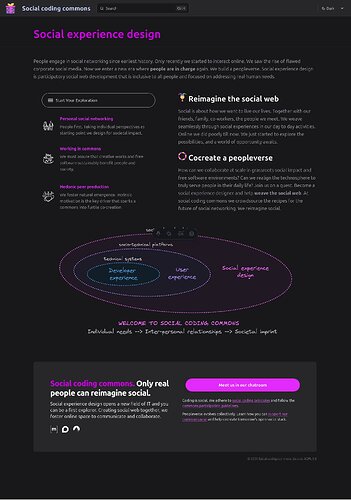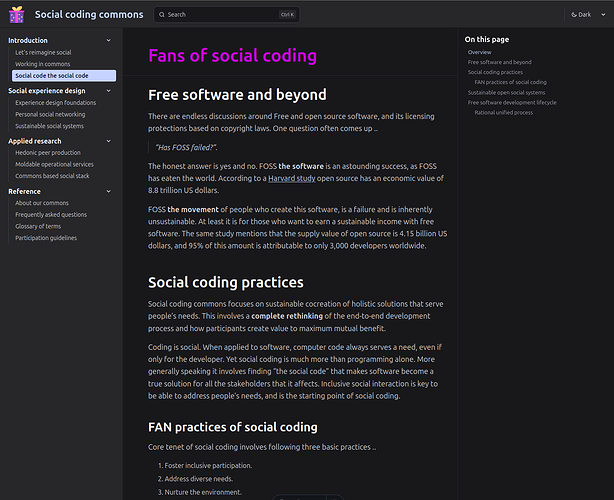Since posting the above we are repositioning and “social coding movement” is now called ..
Social coding commons
(Pasting the text below from matrix chat I had this morning.)
The direction I’ve always been putting Social coding commons on, is the one where major fediverse challenges can be overcome. All of these challenges have in common a root cause of the inability to collaborate at scale in grassroots environments and create sustainable solutions that serve people’s needs and are able to evolve as these needs change over time.
Social experience design
A truly comprehensive SX methodology is emerging from this, which has Peopleverse as a shared (technology) vision. This methodology serves to give people a complete different perspective and mindset to the development of FOSS. SX follows a holistic approach that makes inclusion and diversity very natural characteristics to tender and care for (and not silly culture war ‘divide ourselves to be conquered’ mines that explode in our face). It brings very natural dynamics to how collaboration and cocreation take place, without resulting in trying to get artificial governance models in place that only work in biz environments under hypercapitalism. A doomed approach says Conway’s Law.
Sustainable open social systems
Sustainability-first and at any time are a core principle. SX deals about SOSS, Sustainable open social systems, not ‘FOSS projects’ and ‘FOSS movement’ which are where a) stuff is inherently unsustainable and b) FOSS practitioners by working-in-public are complicit in the dystopic societal trends that mindless technology introductions cause.
SX at its broadest is a complete field in IT. Hence it can facilitate millions of people. It encompasses both UX and DX.
The SX scope is set as follows:
- Social networking: Any direct or indirect human interaction between people (so both offline and online).
- Social media: A small subset (domain) of social networking where people publish information to larger audiences.
- Social web: All social networking protocols and technologies, plus ecosystems that evolve them.
- Fediverse: A category name like web or internet to refer either to the virtual environment people go to, or the social web installed base, depending on context.
- Fedizens: People participating on the fediverse virtual environment.
- Fedi: A subset of the fediverse where a unique culture of cocreation thrives. to be nurtured and fostered.
- FOSS: Software that adheres to the four freedoms, by its copyright-based license protections.
- FOSS / Free software movement: Not a direct SX concept! Anyone dabbling in code, and inherently unsustainable for those who want earn a living here.
- SOSS: Initiative on a trajectory towards sustainability, creating social networking solutions that serve the diverse needs of all its stakeholders.
- FSDL: End-to-end Free software development lifecycle. A SOSS addresses the relevant aspects of its FSDL in order to meet with sustainability criteria.
- The commons: All people social networking together within the construct of society (currently imprinting the unsustainable model of “hypercapitalism”). This is the second perspective of SX that considers inter-personal relationships between (groups of) people.
- A commons: Any grassroots environment where people try to form collaborative arrangements.
Hedonic peer production
How does Social coding commons grow? Based on hedonic peer production this goes:
- Spontaneously, by gradual emergence, as value accrues and attracts/activates more people.
- Leaderless, through intrinsic motivation of people pursuing their own dreams and passions.
- Without membership, just via affiliation and value alignment and perception of overlapping interests.
- Through proactive participation. A participants sows, nurtures, so they can harvest.
- Through service development and exchange aimed at value aggregation and finding synergies.
- Supported by social web technologies that make it possible to do all of the above at scale.
Website drafts
Some drafts of new website being created..

